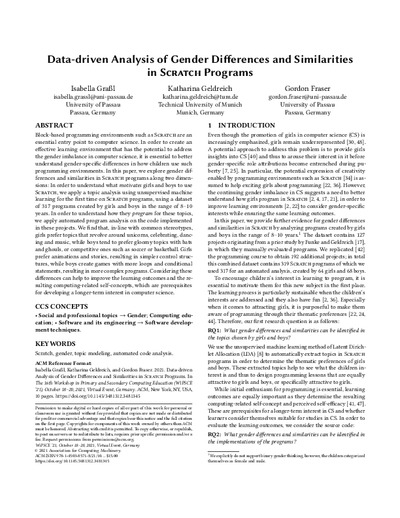Data-driven Analysis of Gender Differences and Similarities in Scratch Programs Publikationsdatum:
Zu finden in: WiPSCE '21, 2021
|
 |
 Diese Seite wurde seit 2 Jahren inhaltlich nicht mehr aktualisiert.
Unter Umständen ist sie nicht mehr aktuell.
Diese Seite wurde seit 2 Jahren inhaltlich nicht mehr aktualisiert.
Unter Umständen ist sie nicht mehr aktuell.
 Zusammenfassungen
Zusammenfassungen


Block-based programming environments such as Scratch are an essential entry point to computer science. In order to create an effective learning environment that has the potential to address the gender imbalance in computer science, it is essential to better understand gender-specific differences in how children use such programming environments. In this paper, we explore gender differences and similarities in Scratch programs along two dimensions: In order to understand what motivates girls and boys to use Scratch, we apply a topic analysis using unsupervised machine learning for the first time on Scratch programs, using a dataset of 317 programs created by girls and boys in the range of 8–10 years. In order to understand how they program for these topics, we apply automated program analysis on the code implemented in these projects. We find that, in-line with common stereotypes, girls prefer topics that revolve around unicorns, celebrating, dancing and music, while boys tend to prefer gloomy topics with bats and ghouls, or competitive ones such as soccer or basketball. Girls prefer animations and stories, resulting in simpler control structures, while boys create games with more loops and conditional statements, resulting in more complex programs. Considering these differences can help to improve the learning outcomes and the resulting computing-related self-concepts, which are prerequisites for developing a longer-term interest in computer science.
 Dieses Konferenz-Paper erwähnt ...
Dieses Konferenz-Paper erwähnt ...
 Personen KB IB clear | Joel C. Adams , Efthimia Aivaloglou , Sylvia Beyer , Karen Brennan , Evelyn Eastmond , Alexandra Funke , Katharina Geldreich , Dorothee Graswald , Susan M. Haller , Kelly Hay , Felienne Hermans , Peter Hubwieser , Elena Hubwieser , Yasmin B. Kafai , Caitlin Kelleher , John Maloney , Amon Millner , Andrés Monroy-Hernández , Randy Pausch , Julie Perrault , Mitchel Resnick , Eric Rosenbaum , Natalie Rusk , Kristina Rynes , Jay Silver , Brian Silverman , Alexandra Simon , Andrew R. Webster | |||||||||||||||||||||||||||||||||||||||||||||||||||||||||||||||||||||||||||||||||
 Begriffe KB IB clear | code smells
, GenderGender
, Informatikcomputer science
,  machine learning
, machine learning
,  Programmieren Programmieren programming
, programming
,  Scratch Scratch
| |||||||||||||||||||||||||||||||||||||||||||||||||||||||||||||||||||||||||||||||||
 Bücher |
| |||||||||||||||||||||||||||||||||||||||||||||||||||||||||||||||||||||||||||||||||
 Texte |
|
 Dieses Konferenz-Paper erwähnt vermutlich nicht ...
Dieses Konferenz-Paper erwähnt vermutlich nicht ... 
 Nicht erwähnte Begriffe | Informatik-Didaktik, Informatik-Unterricht (Fachinformatik) |
 Tagcloud
Tagcloud
 Zitationsgraph
Zitationsgraph
 Zitationsgraph (Beta-Test mit vis.js)
Zitationsgraph (Beta-Test mit vis.js)
 Zeitleiste
Zeitleiste
 2 Erwähnungen
2 Erwähnungen 
- WiPSCE '22 - The 17th Workshop in Primary and Secondary Computing Education, Morschach, Switzerland, 31 October 2022 - 2 November 2022 (Mareen Grillenberger, Marc Berges) (2022)

- 6. Gender-dependent Contribution, Code and Creativity in a Virtual Programming Course (Isabella Graßl, Gordon Fraser) (2022)


- 6. Gender-dependent Contribution, Code and Creativity in a Virtual Programming Course (Isabella Graßl, Gordon Fraser) (2022)
- WIPSCE '23 - The 18th WiPSCE Conference on Primary and Secondary Computing Education Research (Sue Sentance, Mareen Grillenberger) (2023)
- Beyond Gender Differences - Can Scratch Programs Indicate Students' Preferences? (Anette Bentz, Bernhard Standl) (2023)


- Beyond Gender Differences - Can Scratch Programs Indicate Students' Preferences? (Anette Bentz, Bernhard Standl) (2023)
 Anderswo finden
Anderswo finden
 Volltext dieses Dokuments
Volltext dieses Dokuments
 |  Data-driven Analysis of Gender Differences and Similarities in Scratch Programs: Fulltext at the ACM Digital Library ( Data-driven Analysis of Gender Differences and Similarities in Scratch Programs: Fulltext at the ACM Digital Library ( : :  , 2762 kByte; , 2762 kByte;  : :  ) ) |
 Anderswo suchen
Anderswo suchen 
 Beat und dieses Konferenz-Paper
Beat und dieses Konferenz-Paper
Beat hat Dieses Konferenz-Paper während seiner Zeit am Institut für Medien und Schule (IMS) ins Biblionetz aufgenommen. Beat besitzt kein physisches, aber ein digitales Exemplar. Eine digitale Version ist auf dem Internet verfügbar (s.o.). Es gibt bisher nur wenige Objekte im Biblionetz, die dieses Werk zitieren.




















 Biblionetz-History
Biblionetz-History